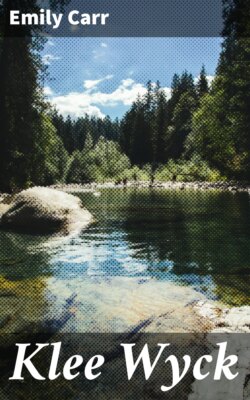Читать книгу Klee Wyck - Emily Carr - Страница 9
На сайте Литреса книга снята с продажи.
CUMSHEWA
ОглавлениеTable of Contents
Tanoo, Skedans and Cumshewa lie fairly close to each other on the map, yet each is quite unlike the others when you come to it. All have the West Coast wetness but Cumshewa seems always to drip, always to be blurred with mist, its foliage always to hang wet-heavy. Cumshewa rain soaked my paper, Cumshewa rain trickled among my paints.
Only one house was left in the village of Cumshewa, a large, low and desolately forsaken house that had a carefully padlocked door and gaping hole in the wall.
We spent a miserable night in this old house. Louisa’s cat and the missionary’s daughter always looked and acted alike when it rained. All our bones were pierced with chill. The rain spat great drops through the smoke-hole into our fire. In comfortless, damp blankets we got through the night.
In the morning Jimmy made so hot a fire that the rain splatters hissed when they dropped into it. I went out to work on the leaky beach and Jimmy rigged up a sort of shelter over my work so that the trickles ran down my neck instead of down my picture, but if I had possessed the arms and legs of a centipede they would not have been enough to hold my things together, to defy the elements’ meanness towards my canopy, materials and temper.
Through the hole in the side of the house I could hear the fretful mewings of the missionary’s daughter and the cat. Indian people and the elements give and take like brothers, accommodating themselves to each others’ ways without complaint. My Indians never said to me, “Hurry and get this over so that we may go home and be more comfortable.” Indians are comfortable everywhere.
Not far from the house sat a great wooden raven mounted on a rather low pole; his wings were flattened to his sides. A few feet from him stuck up an empty pole. His mate had sat there but she had rotted away long ago, leaving him moss-grown, dilapidated and alone to watch dead Indian bones, for these two great birds had been set, one on either side of the doorway of a big house that had been full of dead Indians who had died during a small-pox epidemic.
Bursting growth had hidden house and bones long ago. Rain turned their dust into mud; these strong young trees were richer perhaps for that Indian dust. They grew up round the dilapidated old raven, sheltering him from the tearing winds now that he was old and rotting because the rain seeped through the moss that grew upon his back and in the hollows of his eye-sockets. The Cumshewa totem poles were dark and colourless, the wood toneless from pouring rain.
When Jimmie, Louisa, the cat and the missionary’s daughter saw me squeeze back into the house through the hole and heard me say, “Done”, they all jumped up. Curling the cat into her hat, Louisa set about packing; Jimmie went to prepare his boat. The cat was peeved. She preferred Louisa’s hat near the fire to the outside rain. Even the missionary’s daughter showed animation as she rolled up blankets.
The memory of Cumshewa is of a great lonesomeness smothered in a blur of rain. Our boat headed for the sea. As we rounded the point Cumshewa was suddenly like something that had not quite happened.
